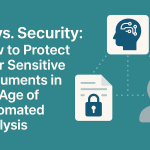Overview
The article titled “Top 7 Benefits of Electronic Signatures for Your Business” emphasizes the significant advantages that electronic signatures provide to businesses. It asserts that electronic signatures not only enhance operational efficiency but also reduce costs, bolster security, and promote environmental sustainability. This is substantiated by compelling evidence, including:
- Reduced turnaround times for contracts
- Substantial cost savings on paper and printing
By addressing these key points, the article effectively engages legal professionals, encouraging them to consider the transformative potential of electronic signatures in their operations.
Introduction
In a world increasingly driven by digital transformation, electronic signatures have emerged as a game-changer for businesses seeking efficiency and compliance. These digital affirmations not only streamline document workflows but also offer a secure and environmentally friendly alternative to traditional signing methods.
With legal frameworks like the ESIGN Act and the eIDAS regulation backing their validity, e-signatures are revolutionizing how organizations manage contracts and agreements. As companies navigate the complexities of modern business, the advantages of adopting e-signature solutions become evident—enhancing operational efficiency, reducing costs, and promoting sustainability.
This article delves into the multifaceted benefits of electronic signatures, exploring their impact on productivity, security, and environmental responsibility in today’s fast-paced corporate landscape.
Understanding Electronic Signatures: A Brief Overview
Electronic marks, commonly referred to as e-marks, serve as digital affirmations of an individual’s intent to consent to the terms of a document. They can manifest in various forms, including a scanned image of a handwritten mark, a typed name, or a unique digital code. The legal status of e-signatures has been bolstered in numerous jurisdictions, primarily through laws such as the ESIGN Act in the United States and the eIDAS regulation in Europe, both of which recognise e-signatures as legally equivalent to traditional handwritten marks.
This legal endorsement is pivotal for businesses striving to enhance operational efficiency while adhering to compliance standards. The legal recognition of electronic signatures is continually evolving, with many countries updating their laws to accommodate digital transactions by 2025. Recent developments indicate a surge in the adoption of e-signatures across various sectors, driven by the necessity for secure and efficient file management. Current statistics reveal that over 10,000 companies worldwide utilise e-signature solutions, underscoring their growing significance in business practices.
The importance of e-signatures transcends mere convenience; they play a crucial role in ensuring compliance with regulatory requirements. The platform enhances client engagement through customisable portals that facilitate secure sharing and signing of documents, conducting ID checks, and requesting documents and data. These portals are designed for user-friendliness and can be tailored to meet the specific needs of each client, ensuring a seamless experience.
Moreover, the automated workflows of this service streamline processes, simplifying the management of client contracts for legal firms. The platform incorporates robust security measures, including encryption standards and compliance with legal regulations, to safeguard sensitive information. Expert opinions emphasise that adopting e-signature technology not only streamlines processes but also bolsters security and sustainability efforts.
For instance, implementing electronic signature solutions can potentially conserve up to 2.5 billion trees over the next two decades, highlighting their environmental advantages. Real-world applications of electronic signatures illustrate their effectiveness in maintaining compliance. Businesses across various industries are increasingly integrating e-signatures into their workflows to facilitate secure transactions and enhance customer relationships. The reminder features for electronic signature tasks, questionnaires, and portal invitations further elevate client engagement, ensuring that critical tasks are not overlooked.
Case studies demonstrate that organisations employing e-signature solutions have experienced increased productivity and improved financial outcomes, particularly during economic fluctuations. This trend underscores the strategic value of e-signatures in contemporary business operations, establishing them as an indispensable tool for legal firms and other professionals navigating the complexities of compliance in 2025. As Tara Kachaturoff noted, MyDocSafe is recognised for its ease of use in managing client contracts, further solidifying its position as a leader in the e-signature market.
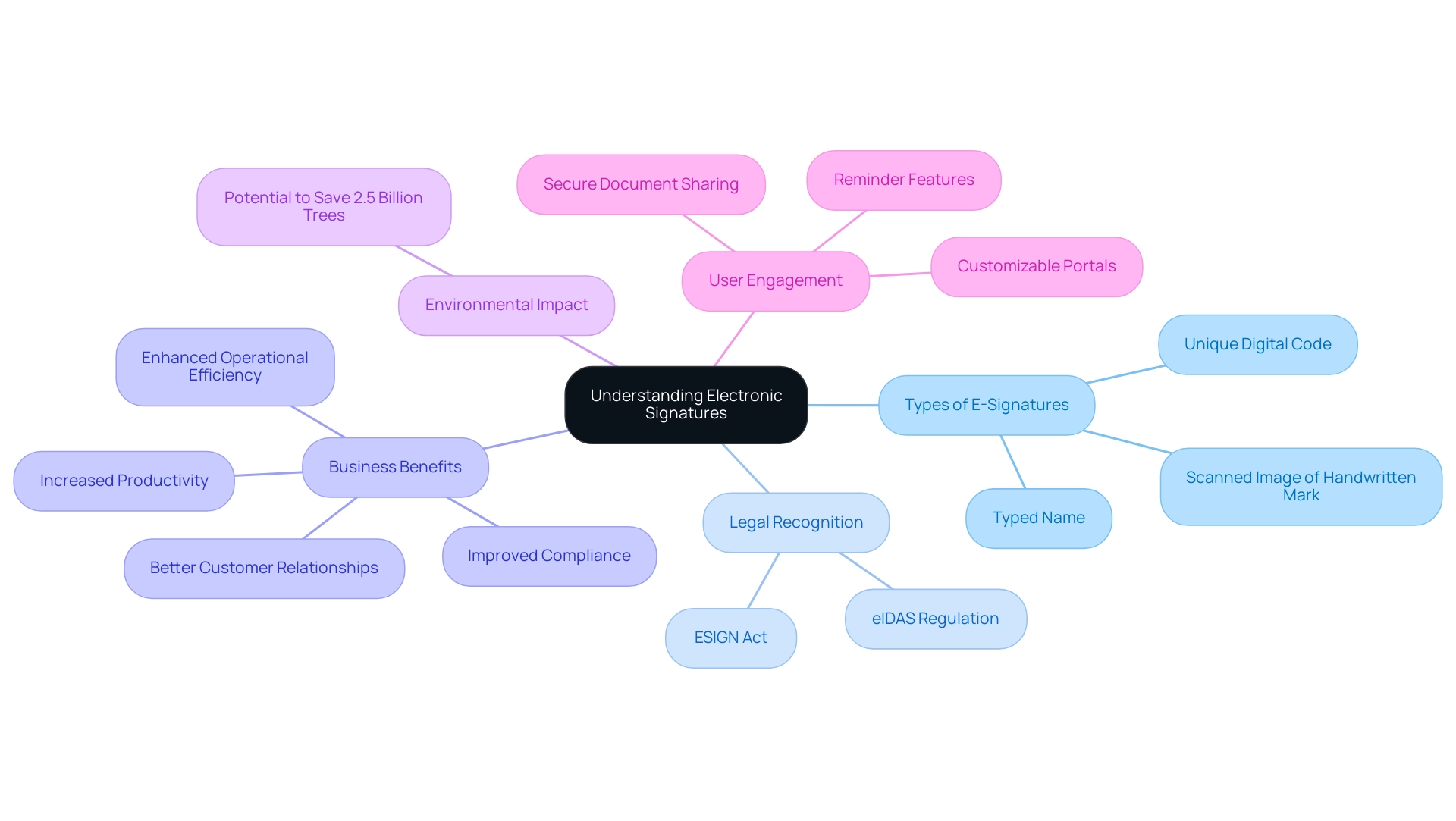
Why Choose Electronic Signatures? Key Advantages for Businesses
Businesses are increasingly embracing the electronic signature, recognising its myriad advantages that extend beyond mere convenience. These digital solutions significantly enhance efficiency by streamlining workflows, allowing organisations to minimise the time spent on manual processes. In fact, companies that implement e-signatures report a reduction in turnaround time for contracts by up to 80%, leading to faster deal closures and improved client satisfaction.
Moreover, the financial benefits are substantial. By reducing paper consumption and associated costs, businesses can allocate resources more effectively. This shift not only contributes to cost savings but also aligns with environmental sustainability goals, as e-signatures help decrease the carbon footprint associated with traditional handling.
Security is another critical factor driving the adoption of electronic signature technology. With top-level encryption standards and compliance with regulations such as GDPR, organisations can ensure that sensitive information remains protected. This emphasis on security is illustrated by the platform, which provides customisable client portals for each customer, deal, or project, allowing safe file sharing and signing, conducting ID verifications, and requesting files and data.
The platform also provides features like password protection, SMS codes, and bulk sending, enhancing the security and efficiency of document management. Automated workflows from this platform enhance productivity and client satisfaction for over 10,000 companies worldwide. As Tara Kachaturoff noted, MyDocSafe provides “ease of use for managing client contracts,” which is essential for businesses looking to streamline their operations.
The shift towards digital approvals is additionally backed by the remarkable market expansion, as shown by DocuSign earning $2.5 billion in revenue in the 2023 fiscal year, with $2.4 billion from subscription sales. This emphasises the increasing acknowledgment of the benefits that digital marks offer, including enhanced collaboration among remote teams. By facilitating seamless interactions, e-signatures enable teams to finalise agreements without the need for physical presence, thus enhancing operational flexibility.
In summary, the advantages of electronic signatures for businesses are clear: they drive efficiency, reduce costs, bolster security, and promote environmental sustainability by minimising paper consumption. As more organisations acknowledge these advantages, the transition towards digital solutions is expected to persist, reshaping the environment of record management and client interaction, especially with extensive solutions similar to those provided by alternative services. We would love to hear about your requirements.
Contact a member of our team today at (863) 270 9779 (5 am – noon EDT) to discover how MyDocSafe can improve your management processes.
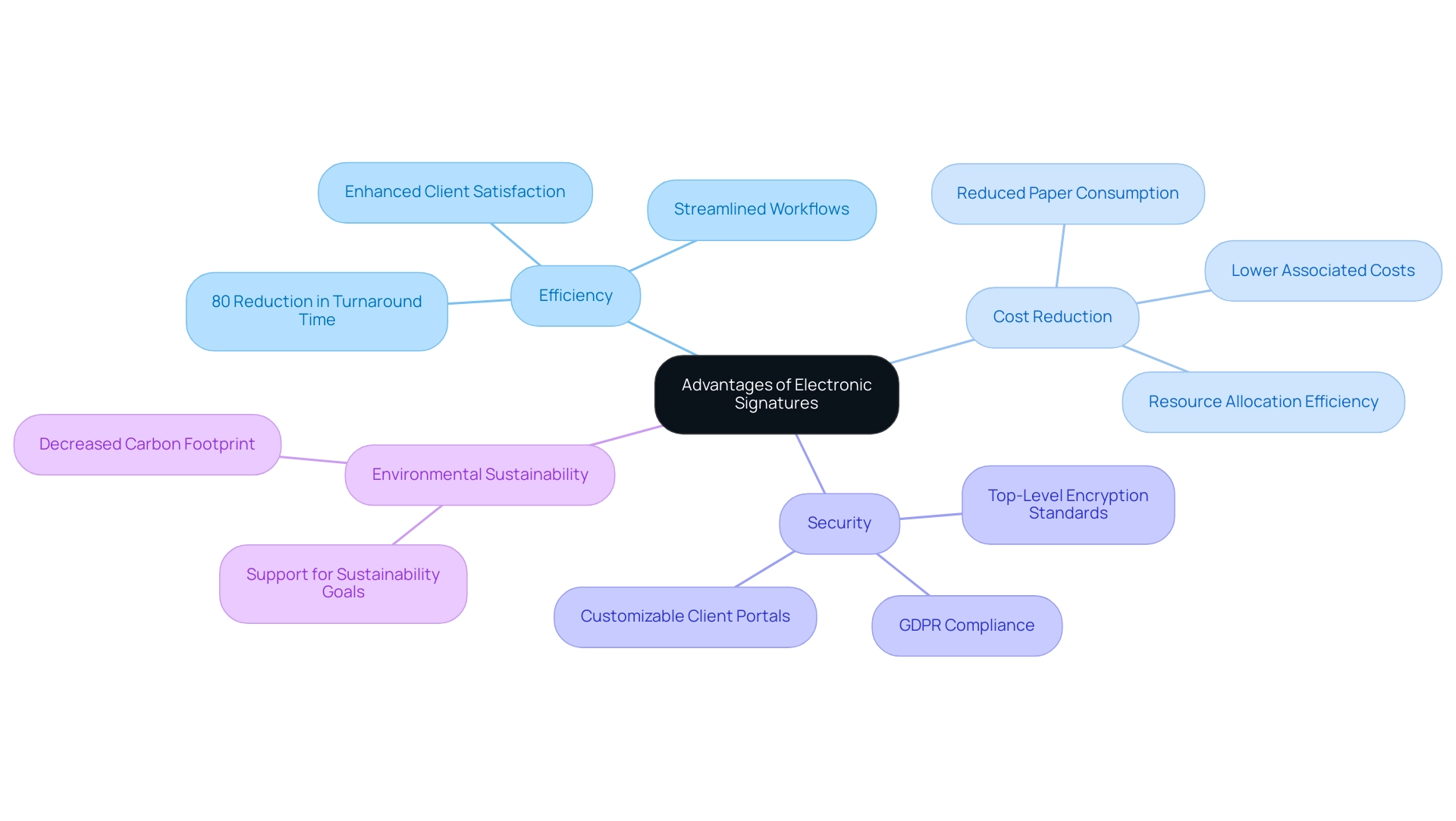
Enhanced Efficiency: Speeding Up Document Processes
One of the most significant benefits of using an electronic signature lies in the remarkable efficiency it introduces to paperwork processes. Traditional signing methods often require a cumbersome sequence of printing, signing, scanning, and emailing papers, consuming valuable time. In stark contrast, MyDocSafe’s electronic signatures enable files to be signed digitally within seconds, effectively eliminating the need for physical handling.
This swift transition not only accelerates the signing process but also minimises the potential for errors and delays. Businesses can finalise agreements more rapidly, enhancing cash flow. Statistics reveal that companies can save an average of £36 per contract by avoiding the costs associated with shipping and storing physical documents. Furthermore, a notable 65% of companies that still rely on pen and paper report that obtaining physical approvals can take an entire working day, highlighting the inefficiencies of traditional methods. By 2025, the effectiveness of digital approvals will be underscored by case studies demonstrating substantial time savings.
For instance, businesses that have adopted electronic signature solutions report an average reduction in document processing times by up to 80%, showcasing the transformative impact of this technology.
Expert opinions further reinforce the advantages of e-signatures over traditional methods. Many industry leaders agree that the speed of electronic signatures enhances operational efficiency and improves client satisfaction by providing a seamless experience. Additionally, this platform distinguishes itself with a strong focus on security, utilising top-level encryption standards to protect sensitive information while ensuring compliance with regulations like GDPR.
This commitment to security and compliance enhances productivity and client satisfaction, establishing this solution as a trusted tool for over 10,000 companies worldwide.
Moreover, this platform offers a range of features that streamline document management and client onboarding, including client access portals, virtual data rooms, and ID verification services. These tools, combined with customisable workflows and a paperless quoting process, further illustrate how MyDocSafe simplifies operations and enhances compliance. As organisations progressively acknowledge the importance of digital solutions, the adoption of digital approvals is becoming a standard practice, enhancing productivity and cultivating a more flexible business environment.
The increasing success of digital signing solutions is further demonstrated by DocuSign, which generated £2.5 billion in revenue in the 2023 fiscal year, marking a 20% rise from the prior year. This trend highlights the growing acceptance and effectiveness of digital signing solutions across numerous sectors.
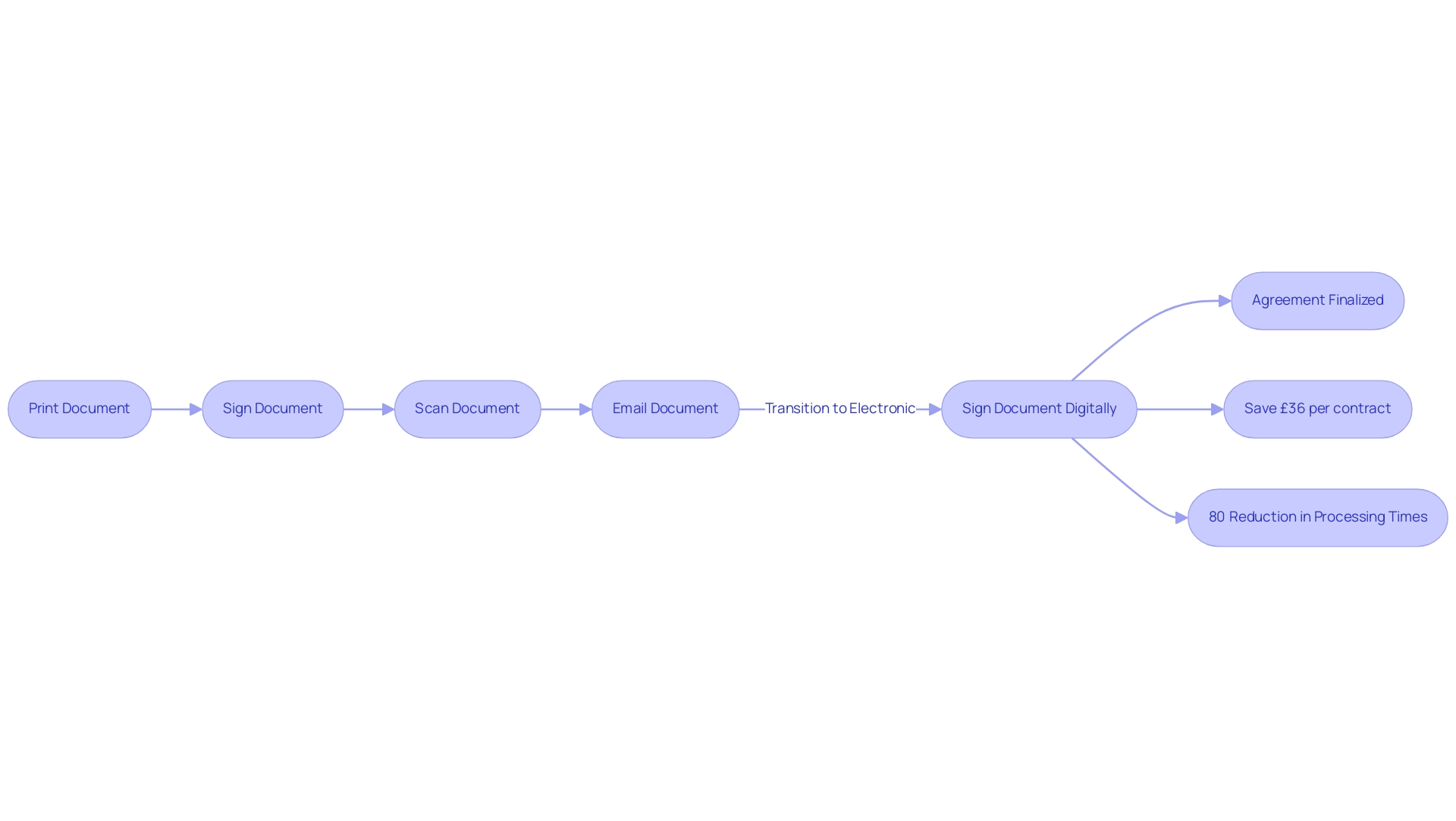
Legal Validity: Ensuring Compliance with Regulations
An electronic signature possesses legal validity and enforceability across numerous jurisdictions, contingent upon adherence to specific criteria established by legislation such as the ESIGN Act and the Uniform Electronic Transactions Act (UETA) in the United States. These regulations confirm that digital marks, such as electronic signatures, cannot be disregarded merely because of their virtual form, offering a strong legal basis for companies that employ them in contracts and agreements.
As we approach 2025, the legal environment continues to evolve, with states like Kansas embracing the Uniform Electronic Transactions Act, which acknowledges the validity of digital marks and records, albeit with particular exceptions for wills and specific UCC transactions. This advancement underscores the significance of compliance for companies, particularly those utilising MyDocSafe, as the platform is designed to promote adherence to such regulations, thereby minimising potential legal conflicts. Furthermore, compliance statistics indicate that regions like California have particular guidelines, such as Rule 2.257 of the California Rules of Court, which specifies the criteria for endorsements on electronically submitted materials.
Understanding local regulations is crucial to ensure that electronic signature processes are legally valid.
MyDocSafe enhances client interaction through its reminder features, which alert users about requests for digital approvals, questionnaires, and portal invitations. This effective notification management balances utility and avoids spam, ensuring clients remain informed and engaged throughout the document management process.
Case studies further illustrate the practical implications of these regulations. For instance, proposed amendments to the Medical Review Officer (MRO) functions aim to eliminate explicit references to transmission methods for documentation related to test results. This change not only simplifies the review process but also improves flexibility in how MROs obtain and manage documentation, demonstrating the adaptability of digital methods in compliance situations.
As businesses increasingly depend on digital solutions, ensuring adherence to evolving regulations is paramount. Tara Kachaturoff, a user of the platform, emphasises its ease of use for managing client contracts, which is a significant advantage in today’s fast-paced business environment. This legal support not only offers reassurance but also enhances operational efficiency, making the electronic signature an essential resource for contemporary business practices.
The platform’s emphasis on security, incorporating encryption standards, blockchain solutions, and user-friendliness, along with its extensive functionality, further strengthens its value in assisting companies navigating the complexities of digital compliance. Additionally, MyDocSafe’s adherence to GDPR guidelines and other compliance materials ensures that users can trust the platform to meet their legal obligations.
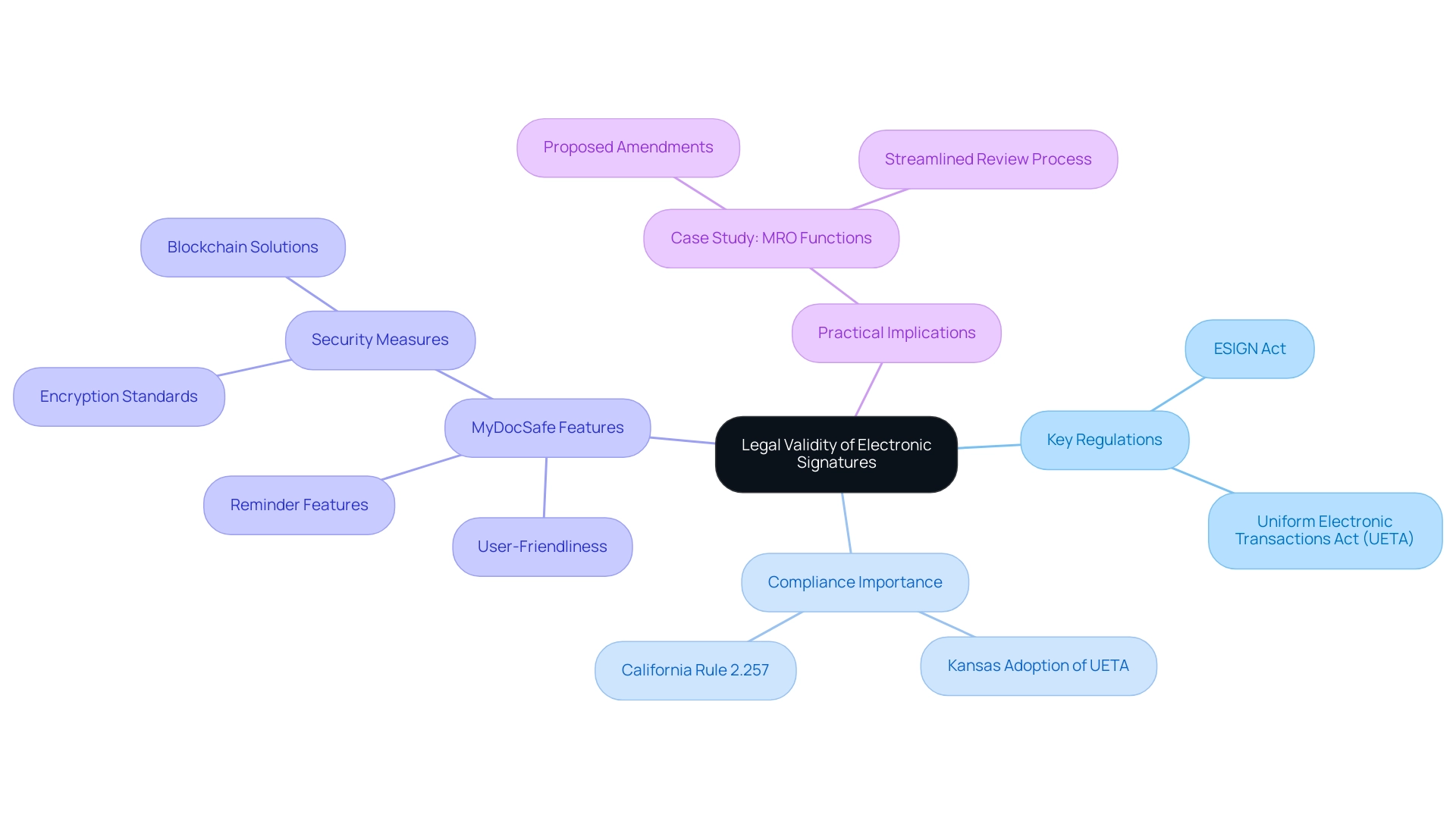
Cost Savings: Reducing Operational Expenses
Adopting digital methods can lead to substantial cost reductions for companies, particularly in 2025, as organisations increasingly prioritise digital solutions. By reducing reliance on paper, printing, postage, and storage, companies can significantly lower their operational expenses. Research indicates that businesses can save an average of £6 per transaction by implementing electronic signatures, resulting in considerable financial benefits over time.
Moreover, transitioning to electronic signatures not only decreases materiel costs but also streamlines workflows, thereby reducing labour expenses associated with manual handling. This operational efficiency is vital, especially since 73% of e-signature customers believe that economic downturns do not lessen the need for electronic signature technology. This statistic highlights the enduring importance of electronic signatures during challenging economic periods. A notable trend is the increasing number of organisations adopting digital-first strategies, with 36% planning to implement electronic signature solutions in the near future.
This shift is crucial for maintaining competitiveness and enhancing customer experiences, as evidenced by a 50% increase in businesses using electronic signatures since the COVID-19 pandemic began. Furthermore, 69% of individuals express their intention to continue utilising electronic signatures post-pandemic, underscoring their essential role in contemporary business practices.
MyDocSafe enriches this experience by providing customisable client portals that facilitate secure sharing and signing, alongside features such as password protection and SMS codes for additional security. Additionally, the platform enables bulk document sending, utilises mail merge, and integrates into complex workflows, further optimising the document management process. Tara Kachaturoff, a user, emphasises the simplicity of managing client contracts, showcasing the user-friendly nature of digital agreements.
Case studies demonstrate that companies leveraging electronic signature technology have effectively reduced operational expenses, illustrating the tangible advantages of this approach. By incorporating electronic signatures into their processes, businesses not only realise cost savings but also enhance productivity, making it a strategic investment for the future. Moreover, the platform supports cost-effective sales processes while ensuring security, sustainability, and compliance, further reinforcing the benefits of adopting electronic signature solutions.
The alert system within the platform plays a crucial role in improving file management and client interaction, ensuring that all parties remain informed and updated throughout the signing process. For more information or to discuss your requirements, please contact our team at (863) 270 9779.
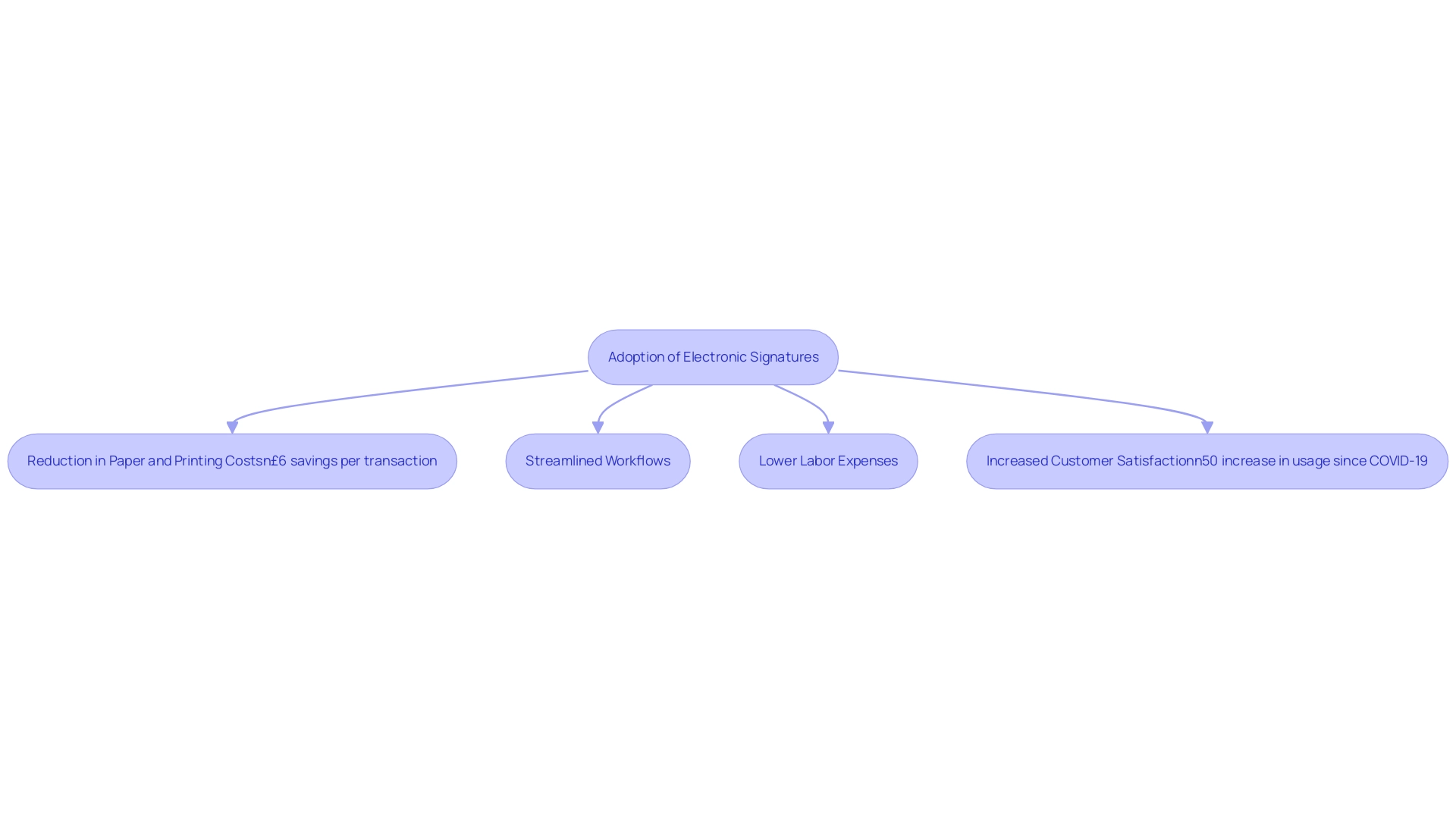
Improved Security: Protecting Sensitive Information
Electronic signatures represent a significant advancement in security compared to conventional signing methods, leveraging advanced encryption technologies to safeguard sensitive information and ensure integrity. The new viaSocket integration from the service amplifies these capabilities, empowering law firms to streamline file management and e-signature solutions effectively. Not only does this integration enhance compliance, but it also fosters client engagement through customisable client portals and automated workflows, as elaborated in the user manual.
Key security features of the e-signature solutions encompass:
- Robust audit trails that meticulously document who signed a file and when, thereby bolstering accountability and transparency.
- This functionality is crucial for organisations that must adhere to stringent regulations such as GDPR, as it facilitates comprehensive documentation of the signing process.
Data indicates that over 10,000 businesses globally have adopted this solution, underscoring its effectiveness in enhancing file management and client interaction through secure electronic signatures. The platform’s commitment to security and compliance is further highlighted by its utilisation of top-tier encryption standards, which protect sensitive information from unauthorised access. Specifically, these encryption technologies are employed to ensure that all documents remain confidential and secure throughout the signing process.
Moreover, MyDocSafe enhances client engagement by providing reminders for signing requests, questionnaires, and portal invitations, ensuring timely responses. Case studies illustrate the tangible advantages of these security features. For example, businesses that have transitioned to e-signatures report increased productivity and client satisfaction, as streamlined processes diminish the risk of errors and delays associated with traditional methods.
As Tamara Shasha noted, “The pandemic has shown that eSignatures are easy to use, as this was the only way that business could continue in most industries.” This real-world perspective underscores the relevance and necessity of e-signatures in today’s digital landscape.
The focus on security aspects in digital identifiers continues to intensify, with advancements in encryption technologies further fortifying these systems. As businesses increasingly depend on digital solutions, the ability to protect sensitive information through secure e-signatures evolves from being an advantage to becoming an essential requirement.
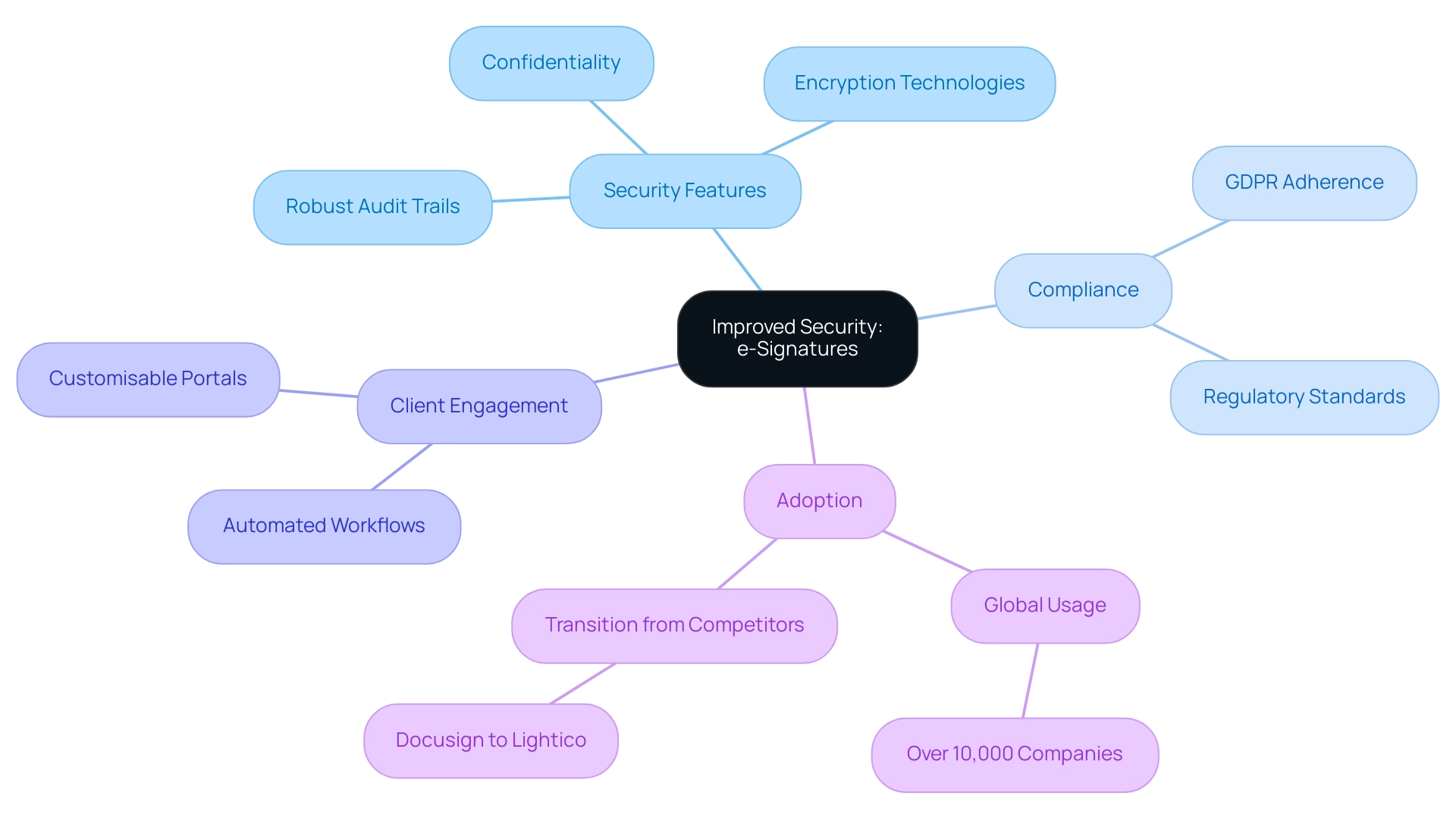
Eco-Friendly: Reducing Paper Waste and Environmental Impact
Transitioning to electronic signatures is pivotal in promoting environmental sustainability by significantly reducing paper waste. Traditional signing methods necessitate extensive paper use, contributing not only to deforestation but also elevating carbon emissions associated with paper production and disposal. By adopting electronic signatures, businesses can drastically reduce their paper consumption, leading to a smaller environmental footprint.
This eco-conscious strategy aligns with corporate social responsibility initiatives and resonates with clients who prioritise sustainability. In fact, companies that adopt paperless solutions, such as those using digital platforms, have been shown to reduce processing errors by an impressive 90% on average, further enhancing operational efficiency. As Tara Kachaturoff noted, MyDocSafe offers “ease of use for managing client contracts,” making it an effective tool for promoting sustainability through electronic signatures.
However, organisations face challenges in adopting e-signatures, including regulatory concerns, implementation costs, and resistance to digital transformation. Acknowledging these barriers is crucial for businesses aiming to implement sustainable practices effectively. As organisations increasingly recognise the environmental impact of their practices, the transition towards digital approvals is becoming a hallmark of contemporary business operations.
Numerous businesses have reported substantial reductions in paper waste after implementing electronic signature solutions, showcasing a commitment to sustainability while streamlining their processes.
In 2025, the environmental benefits of using an electronic signature are more pronounced than ever, with statistics indicating that businesses can significantly lower their paper waste. This not only contributes to a healthier planet but also positions companies as leaders in the movement towards sustainable practices, appealing to a growing demographic of environmentally aware consumers. Furthermore, MyDocSafe ensures compliance with legal standards and operational guidelines, including GDPR and privacy policies, making it a reliable choice for legal firms looking to enhance their document management processes while adhering to necessary regulations.
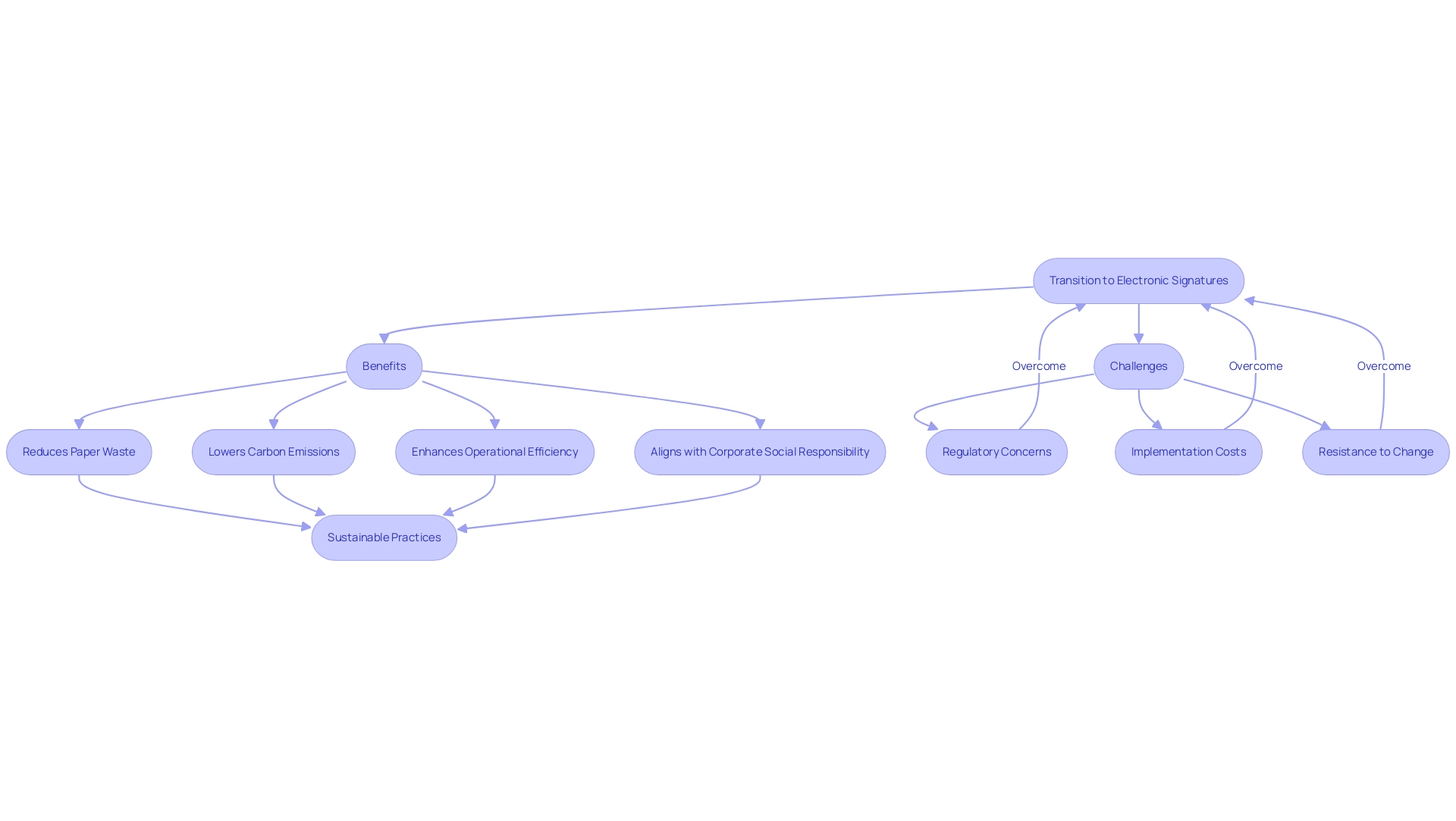
Conclusion
The adoption of electronic signatures signifies a transformative shift in business operations, delivering a multitude of benefits that enhance efficiency, security, and environmental sustainability. E-signatures streamline document workflows, significantly reducing turnaround times and enabling organisations to close deals faster, ultimately improving client satisfaction. This efficiency is accompanied by substantial cost savings, as businesses can minimise expenses related to paper, printing, and storage.
Moreover, the legal validity of electronic signatures, bolstered by established regulations such as the ESIGN Act and eIDAS, empowers organisations to implement these solutions confidently, free from the fear of non-compliance. The robust security features provided by platforms like MyDocSafe protect sensitive information through advanced encryption and comprehensive audit trails, rendering them indispensable tools for businesses navigating the complexities of modern compliance requirements.
The environmental impact of transitioning to e-signatures is significant, as companies drastically reduce paper waste and contribute to sustainability efforts. This alignment with eco-friendly practices not only enhances a company’s reputation but also resonates with a growing demographic of environmentally conscious consumers.
In conclusion, embracing electronic signatures is not merely a trend; it is a strategic necessity for businesses striving to thrive in an increasingly digital landscape. By leveraging the advantages of e-signatures—ranging from enhanced operational efficiency and security to substantial cost savings and environmental responsibility—organisations can position themselves for future success. The shift towards digital solutions is poised to continue, establishing e-signatures as a cornerstone of modern business practices.


